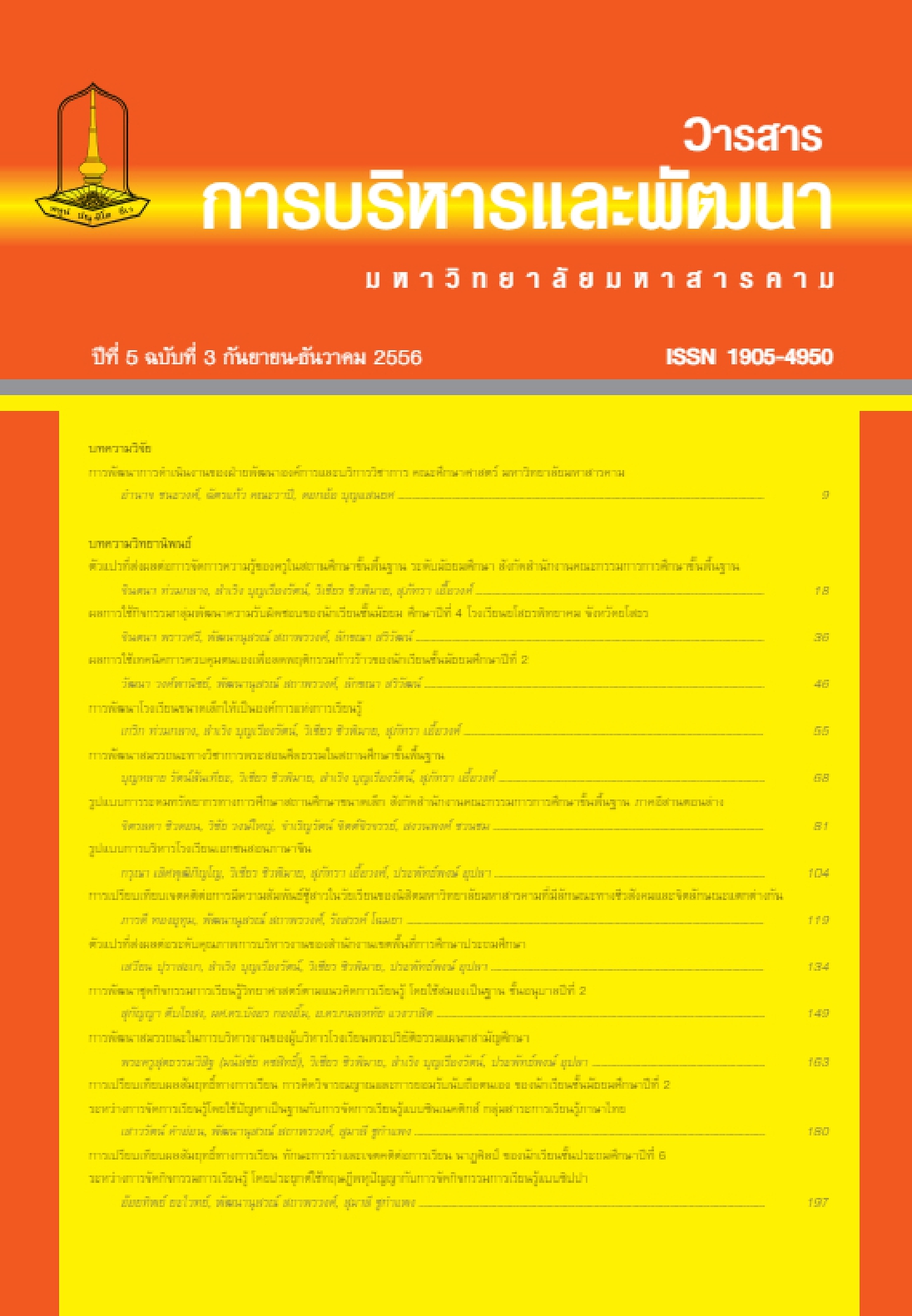Variables Affecting the Knowlledge Managemeng in Secondary schools in the Office of Basic Education Commission.
Main Article Content
Abstract
This research aimed to investigate factors affecting the knowledge management in basic education secondary level schools under the Office of Basic Education Commission. The probability proportional to size of teachers in each school was used to select 60 basic education secondary school level schools under the Office of Basic Education Commission, Ministry of Education in the academic year 2011 in Chaiyaphum, Nakhon Ratchasima, Buriram, Surin and Khon Kaen provinces.The research instruments were six questionnaires designed to measure dependent and independent variables including the knowledge management of the schools (80 items); the level of academic leadership of the schools’ directors (6 items); the motivations of schools’ directors and teachers (20 items); the attitudes of the schools’ directors and teachers towards the schools’ knowledge management (20 items); the cooperation of the schools’ directors and teachers (20 items); and the organizational culture of schools (16 items). The respondents were five directors and teachers from each of the 60 schools; thus then were 360 respondents Statistics for the data analysis were mean, standard deviation, coefficient of variation, beta weight of the independent variable on the dependent variable, multiple correlation and squared multiple correlation.
The results were as follows.1. The schools had the high level of the knowledge management and the levels of the knowledge management in each school were slightly different.
2. Concerning the beta weight (β), it was found that the attitudes of the directors towards the schools’ knowledge management (ALT) had positive impact on the level of the knowledge management (β =0.322) with the statistical significance at α = .05 However, the bureaucratic culture of the schools negatively affected the level of the knowledge management (β =-0.295). with the statistical significance at α = .05 The independent variables explained 35 percent (R=0.591; R2=0.350) of variance of the level of the knowledge management with the statistical significance at α = .05
Downloads
Article Details
References
Anyanee Klaisuban. (2007). Fundamental Knowledge Management. Bangkok: tchkasem Printing Group.
Bodin Wichan. (2004). From Knowledge Management to Practical Wisdom. 2nd Edition. Bangkok: Thankamol.
Boonsong Hanpanich. (2003). The Development of Knowledge Management Models in Thai Higher Education Institutions. Thesis, Doctor of Philosophy in Education. Bangkok: Graduate School, Chulalongkorn University.
Burachai Siramahasakorn. (2007). Excellence through Knowledge Management. Bangkok: Saengdao.
Cooperman, Dan R. (1997, September). “Collaborative Management, Teacher Characteristics, and Instructional Practice: HLM Analysis of The Prospects Data Survey.” Dissertation Abstracts International. 58 (03): 661-A.
Davenport, T. H. (1997). Information Ecology. New York: Oxford University.
Department of Provincial Administration. (2007). Manual for Operation in southern bordering provinces. Bangkok: Internal Security Affairs Bureau, Coordination centre for the administration of the southern bordering provinces.
Enriquez, J. (2001). As the Future Catches You. New York: Tuttle-Mori.
Hersey, Paul and Blanchard, Kenneth H. (1993). Management of Organizational Behavior:Utilizing Human Resources. Englewood Cliffs, N.J.A. Simon and Schmaste Company.
Hoy, Wayne K. and Miskel, Cecil G. (2001). Educational Administration: Theory,
Research Practice. 6th ed. Singapore: McGraw-Hill.
Kosol Deeseentham. (2003) Knowledge Management in the New Economy. Bangkok: Tana Press & Graphic.
Marquardt, Michael J. (1996).Building the Learning Organization.New York: McGraw–Hill.
Namtip Wipawin. (2004). Knowledge Management and Knowledge Assets. Bangkok: SR Printing Mass Products.
Office of the National Economic and Social Development Board. (2008). The Tenth National Economic and Social Development Plan. Bangkok:Kansassana Publishing.
Office of the Public Sector Development Commission and Thailand Productivity Institute. (2005). Knowledge Management Action Plan Development Manual. Bangkok: Thailand Productivity Institute.
Phichet Banyat. (2006). “Organizational Knowledge Management.” Chiang Mai University Library Journal. 13 (1): 1-16.
Pornthida Wichianpanya. (2004). Basic Knowledge Management and the Application. Bangkok: Thankamol Publishing.
Prapon Phasukyud. (2007). Knowledge Management for Newbies. 11th Edition. Bangkok: Yaimai.
Prasit Sarasant. (1999). Managerial Behavior Related to Primary School Administrators’ Managerial Achievement. Dissertation, Doctor of
Philosophy in Education. Bangkok: Graduate School, Srinakharinwirot University, Prasarnmit Campus.
Samrerng Boonruangrutana, Suwat Wiwatthananon and Nikom Nak-ay. (2007). “The Search for Practical Models of Students’ Educational Results with the Least Variables.” Vongchavalitkul University Academic Journal. 1: 7-13.
Singh, K., Granvill, M. and Dicka. S. (2002). “Mathematics and Science Achievement: Effects of Motivation, Interest and Academic Engagement.”The Journal of Education Research. 95 (6): 323-332.
Sirikarn Kraibamrung. (2010). Variables Affecting Levels of School-Based Management Performance of Basic Education Institutions. Thesis, Doctor of Philosophy in Education. Nakhon Ratchasima: Faculty of Education, Vongchavalitkul University.
Smith, E.W. (1997). The Education Encyclopedia. New Jersey: Prentice Hall.
Somsak Chansungnoen. (2009). Variables Affecting Levels of Learning Organization in Schools. Thesis, Doctor of Philosophy in Education. Nakhon Ratchasima: Faculty of Education, Vongchavalitkul University.
Suwat Wiwatthananon. (2005). The Multi-Level Factors Affecting the Effectiveness of the Government Secondary Schools in the Bangkok Metropolis. Thesis, Doctor of Philosophy in Education. Nakhon Ratchasima: Graduate School, Vongchavalitkul University.
Tannonbaum, S.I.,and Alliger, G.M. (2000). Knowledge Management: Clarifying the Key Issue. U.S.A.: the Inernational Association for Human Resource Information Management.
Teera Runcharoen. (2007). Professionalism in Educational Administration in the Age of Educational Revolution. Bangkok: Khao Fang.
Vicharn Panich. (2008). Practical Knowledge Management. 4th Edition. Bangkok: Sukkhapabjai.
Vicharn Panich. (2004, May-June). “Knowledge Triangle.” Academic Journal of Education. 1 (1): 9-12.
Wasan Lajantuk. (2005). Knowledge Management at Basic Education Schools under the Office of Khon Kaen Educational Service Area 4. Thesis, Master of Education. KhonKaen: Graduate School, Khon Kaen University.
Wilawan Makhum. (2006). The Development of Indicators for Knowledge Management of Teachers in Basic Education Institutions under the Ministry of Education. Thesis, Doctor of Philosophy in Education. Bangkok: Graduate School, Srinakharinwirot University, Prasarnmit Campus.


